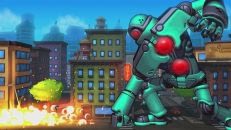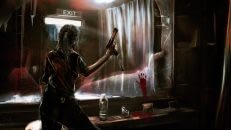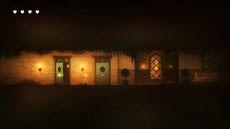Monochroma Review – Subtly Horrifying, Beautifully Simple
When I play horror games, I spend a lot of time yelling, “Nope!” while running in the opposite direction of whatever monster is present. Thus, side-scrollers make me distinctly uncomfortable when they have horror elements, because I can still see what I’m running from, and simply seeing it stresses me out more than actually trying to get away from it. I’m so busy watching the monster to make sure it’s not getting close to me that I completely miss what I’m supposed to be doing, and fail repeatedly. Monochroma takes that tendency to focus on the bad (I can’t be the only one!) and exploits it, but so subtly that I didn’t realize it was happening until an hour into the game. It made me angry, then it made me laugh. Then I quit the game for a while, because I was so keyed-up I felt like I’d had too much caffeine, which is not helpful when you’re trying to navigate increasingly-complex puzzles.
An offering by Nowhere Studios of Istanbul, Monochroma immediately reminded me of LIMBO, a similar tale of a boy fighting a larger presence while solving puzzles and trying not to be caught/killed. The difference here is that Monochroma‘s nameless protagonist is carting an injured little brother around, and you see, sometimes in horrifying detail, exactly what you’re running from (personally, I could only handle the spider in LIMBO because it was just a shadow). There is no dialogue, no overt words telling you what to do or what’s going on, but the scenery tells a good enough story all on its own. This is a world fraught with danger, and you stumble into it because the main character’s little brother loses his kite and runs after it. Anything can (and will) kill you if you don’t pay attention, and it’s not just your own life you have to worry about.
This is a wood chipper. Guess what happens if you’re not fast enough?
The story is one that is deceptively simple if you’re only reading/hearing about the basics: After the aforementioned kite incident, the protagonist and his brother travel for a while, presumably trying to find their way home, and in their wanderings they come across a factory. What they find in that factory is horrifying, and I won’t spoil it for anyone who hasn’t played, but you’re not given much time to ruminate on the visuals, as you immediately begin being chased by one of the employees of the factory. While environmental difficulties present the largest challenge in the game, these periodic chases by “grown-ups” represent those high-stress moments I mentioned earlier. The story is simple, but it ends up not mattering, because the tasks you’re set upon during the adventure take up all of the space in your brain where a plot might get tangled. There may be those who demand more details from the story, but I feel they would remove some of the horror, and thus, some of the appeal.
The darkness of this game was an issue for me in certain areas, because I literally couldn’t see where I could go, or the shape of some objects. This is due to my computer monitor not having the best gamma adjustment in the world, but even the brightness setting on the game, which usually fixes the issue for that gaming session, still left this game too dark for me to navigate easily several times. As such, I have a feeling I wasn’t experiencing all of the scenery, but what I did see was very pleasing, if “man tries to run children down with truck” can be called a “pleasing visual.” The only color that’s not in greyscale is red, and it’s used to highlight important things in the environment, while also calling attention to details the player may otherwise miss, such as a robot being hit by a train (which is actually relevant), or signs alerting to a dangerous piece of machinery (and yes, you do see blood when you die).
“Nope!” is now a way of life.
I can’t describe the sound design in this game without sounding hokey, so I’ll just embrace it: It’s delightful. It is actually, truly, a delight to listen to the sounds and music in Monochroma. The rain, the hiss of fire being extinguished, the creak of a falling crate – in my headphones, it made the world so immersive, and actually aided me in solving more than one puzzle where I couldn’t really see what was happening due to the darkness. The music was done by Turkish band Gevende, and while I normally don’t explicitly tell people to buy a game soundtrack, I’m telling you all: Pre-order it. It’s great, and not just in conjunction with the game. A game without dialogue depends so much more on music to help tell the story and set the mood, and the songs here achieve that in spades.
The controls are very easy – right/left arrows to run, up to jump/climb, down to climb down or hang, space to pick your brother up or put him down, and ctrl or alt to complete actions. There are no navigation surprises, no super powers, you always jump the same distance (carrying the brother adds weight, which is represented in the distance/speed you travel), and the physics are reliable. While earlier versions of the game apparently had bugs, I found none during my playthrough. After the tutorial, gameplay is very consistent as far as controls go, which helps with focusing more on the task at hand: Solving puzzles and getting the heck out of there.
Procedural puzzles bring additional challenges as you progress.
The ending seems to universally disappoint in the reviews I’ve seen, but it simply made me feel sad. After the emotional roller-coaster Monochroma puts you through, you might wish for a happy ending, but not every ending is pleasant – and sometimes it’s just good enough that something has ended. Play the game all the way through, and you’ll know exactly what I mean.
Monochroma is available on Steam for $17.99 until June 4, when it goes up to the normal price of $19.99. The game’s length may cause buyers to feel that they should wait until it’s on sale before buying it, and I think that’s fair, but I also see no issues with the price as-is for the product. The game is available on Windows, Mac, or Linux.
To keep up with the development team, you can follow Nowhere Studios on Twitter and Facebook.





